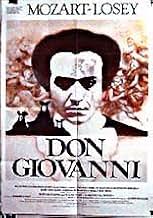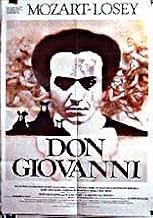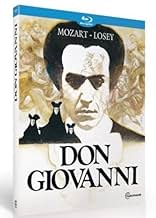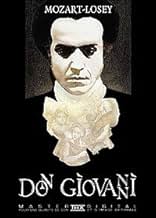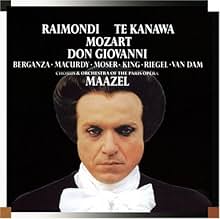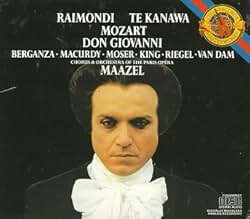VALUTAZIONE IMDb
7,5/10
1376
LA TUA VALUTAZIONE
Aggiungi una trama nella tua linguaMozart's opera in lush sets: Don Giovanni, the infamous womanizer, kills Donna Anna's father. He is then chased by Donna Anna's fiancé, Don Ottavio, as well as Donna Elvira, one of his forme... Leggi tuttoMozart's opera in lush sets: Don Giovanni, the infamous womanizer, kills Donna Anna's father. He is then chased by Donna Anna's fiancé, Don Ottavio, as well as Donna Elvira, one of his former conquests. But the real threat lies elsewhere.Mozart's opera in lush sets: Don Giovanni, the infamous womanizer, kills Donna Anna's father. He is then chased by Donna Anna's fiancé, Don Ottavio, as well as Donna Elvira, one of his former conquests. But the real threat lies elsewhere.
- Regia
- Sceneggiatura
- Star
- Nominato ai 2 BAFTA Award
- 4 vittorie e 4 candidature totali
Recensioni in evidenza
I enjoyed it very much. I'm fairly new to the whole wide world of opera but this was very entertaining. But what do I really comment on? Mozart's work, or the movie adaptation of it? Mozart of course is incredible. I love the opening scene, the closing scene and pretty much everything in between. My biggest problem, and I assume that this is true with opera in general is that once I passed the point that I had reached in familiarity from listening to a recording of it, the music was lost to me. I paid more attention to the words and what was going on in the plot than the music.
As for the movie adaptation, aside from it being very strange to watch and listen to an opera written more than 200 years ago on my modern television, I found it enjoyable. Yes, the preceding comment is true that the expressions were exaggerated and more fit for a stage but I don't feel they were inappropriate either. As far as sets and costumes and quality, I have very little basis of comparison, as I have not seen it on stage, or any opera for that matter.
In short, I found it to be very good, though I'm probably one of the very few sixteen year olds who would agree with that.
As for the movie adaptation, aside from it being very strange to watch and listen to an opera written more than 200 years ago on my modern television, I found it enjoyable. Yes, the preceding comment is true that the expressions were exaggerated and more fit for a stage but I don't feel they were inappropriate either. As far as sets and costumes and quality, I have very little basis of comparison, as I have not seen it on stage, or any opera for that matter.
In short, I found it to be very good, though I'm probably one of the very few sixteen year olds who would agree with that.
To make a movie based on an opera is a different thing from filming an opera on stage. Cinema and opera are 2 different forms of art each one with its specific techniques. Nevertheless one can be at the other's service and if the match is excellent the merits of them both will be enhanced. That's what happens with this excellent movie where we can enjoy Mozart's music and the singing talents of such extraordinary artists like Kiri Te Kanawa and others besides a lot of gorgeous and dynamic movie images, sceneries, shots and superb cut and editing. The plot everyone knows: the adventures and misadventures of D. Giovanni the king of philanderers of all times and a more or less disguised attack on aristocracy and its immoral behaviour. We are on the eve of the French Revolution and as everybody also knows Mozart was a freemason and a democrat.
This is a wonderful film, the only non-stage performance I've ever seen of this incredible opera. I saw it a million years ago in college and have probably watched it a dozen times over the years. Raimondi is demonically compelling as the Don, wicked, handsome, sardonic, and Van Dam plays off him as Leporello just wonderfully, balancing humor and pathos. Riegel's Ottavio is just as he should be, a humorless square, and Te Kanawa soars as Elvira. My only casting complaint is with Moser as Anna; she sounds very shrill. I liked the hint that perhaps Anna was, despite appearances, actually quite attracted to the Don as well; her protestations to the lumpish Ottavio that she thought it was actually he who'd come to her bedroom didn't persuade (and frankly, I've always wondered why he was such a putz as to buy it). The settings are lush and lovely, including Palladio's Villa Rotonda. Of course some of the lip-syncing is off a bit, but that's to be expected. I also eagerly await a day when this film is available on DVD.
10Exile-5
Sublime music and the filming on location in Vicenza -- Very well made adaptation of Mozart's masterwork. The settings create a visual feast to rival any operatic stage set. Although I did find Leporello a little dissapointing with its full comic potential not realised.
This is such an outstanding display of cinematic and operatic talent that it should be seen by anyone with any interest in either. It introduced me to opera when it came out so I am eternally grateful.
I'm waiting for the DVD and check here regularly for news. I thought that it had finally arrived in Germany, judging from the display on the iMdb page. Alas, that seems to be a different animal altogether, so we're still waiting. I'll try to get them to fix the link.
Who does one lobby to get a DVD released?
I'm waiting for the DVD and check here regularly for news. I thought that it had finally arrived in Germany, judging from the display on the iMdb page. Alas, that seems to be a different animal altogether, so we're still waiting. I'll try to get them to fix the link.
Who does one lobby to get a DVD released?
Lo sapevi?
- QuizThis opera film features one character who does not appear in the original source Wolfgang Amadeus Mozart 'Don Giovanni' opera, a Valet in Black. The screenplay described this character as "an observer whose presence must always be felt, the guardian - in metaphysical terms - of Don Giovanni's soul". The Valet in Black is present and unspoken in nearly every scene that Don Giovanni is in.
- ConnessioniFeatured in Naked Opera (2013)
I più visti
Accedi per valutare e creare un elenco di titoli salvati per ottenere consigli personalizzati
- How long is Don Giovanni?Powered by Alexa
Dettagli
Botteghino
- Budget
- 7.000.000 USD (previsto)
- Lordo in tutto il mondo
- 9519 USD
Contribuisci a questa pagina
Suggerisci una modifica o aggiungi i contenuti mancanti

